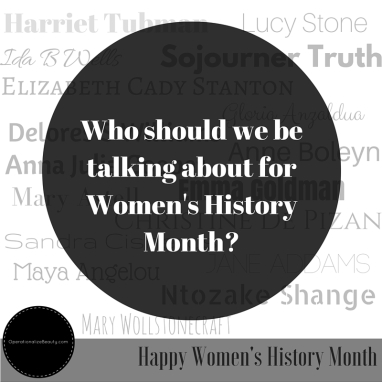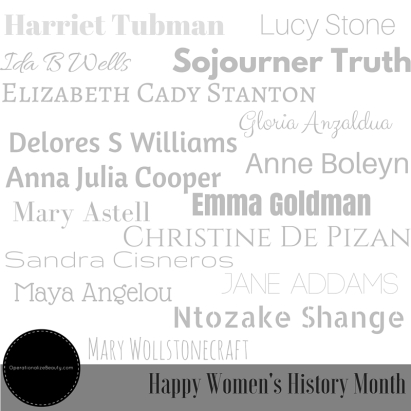I recently happened upon this article by Yale grad student Barbara Sostaita. If you were not among the thousands of people who read and shared the article, let me sum up. The picture at the beginning of the post is of a young Latina flipping off the camera– that sets the tone for the entire article. Sostaita writes passionately about her refusal to celebrate “your feminism,” which she (correctly) understands as being overwhelmingly white.
Maybe it was the tone of her writing, or maybe it was the intensity of her passion, but after reading the article I felt deeply ashamed, embarrassed, and left out. I am white. I thought it was a good idea to celebrate the suffragettes. I thought Hillary Clinton was ok to talk about. And Sheryl Sandberg’s Lean In is on my “to-read” list. I did not recognize a lot of the names that Sostaita brought up. I am not familiar with Toni Morrison’s work; I don’t know who Gloria Anzaldua is; I was unaware that female asylum seekers in a Texas detention centers went on a hunger strike for immediate freedom. I didn’t know who these women were, and that embarrassed me.
I felt deliberately left out of this conversation because of the color of my skin. It wasn’t until the next day that it hit me. Maybe I was feeling just a small bit of what my sisters around the country and the world feel every. frickin. day. I was feeling sorry for myself because I felt left out. But how many women are left out of conversations not only because they were born with the ‘wrong’ anatomy, but the ‘wrong’ amount of melanin in their skin as well.
But Sostaita didn’t stop there. She goes on to say:
This Women’s History Month, I refuse to celebrate a white feminism that keeps women of color on the margins. This Women’s History Month, I refuse to celebrate a white feminism that alienates, subjugates and oppresses women of color. I don’t want to be hear about the first Latina [insert public office title] or the first Asian [insert professional sports title]. I’m sick of women of color only being mentioned and deemed worthy when we are the “first,” when we fit neatly into a box crafted by white women’s version of history. We have been, are, and will always be “exceptional” and “important.”
Ms Sostaita got me thinking– who else am I missing this Women’s History Month? Who should we really be talking about? I asked around, and it seems the majority of the women we generally think of when we think of important women in history are indeed white. There are obviously a few exceptions, as some amazing African American women are consistently lauded (I’m looking at you Harriet Tubman and Sojourner Truth).But I was disappointed to see not one Asian, Hispanic, Indian, or Native American woman on my list.
Here are some of the ladies I heard mentioned when I asked, “Who are some of your favorite women from history?”
 My mom: for real though, big ups to our mommas!
My mom: for real though, big ups to our mommas!
“If you’re not living on the edge, you are taking up too much space!”
 Harriet Tubman: abolitionist, activist, nurse, underground railroad conductor, military hero; buried with military honors at Fort Hill Cemetery in Auburn.
Harriet Tubman: abolitionist, activist, nurse, underground railroad conductor, military hero; buried with military honors at Fort Hill Cemetery in Auburn.“I freed a thousand slaves. I could have freed a thousand more if only they knew they were slaves.”
 Lucy Stone: suffragette, abolitionist; convened the first national Women’s Rights Convention in 1850.
Lucy Stone: suffragette, abolitionist; convened the first national Women’s Rights Convention in 1850.“I think, with never-ending gratitude, that the young women of today do not and can never know at what price their right to free speech and to speak at all in public has been earned.”
 Emma Goldman: fiery speaker and advocate for peace, free love, and birth control; she was deported to the Soviet Union in 1919.
Emma Goldman: fiery speaker and advocate for peace, free love, and birth control; she was deported to the Soviet Union in 1919.“The demand for equal rights in every vocation of life is just and fair; but, after all, the most vital right is the right to love and be loved.”
 Anna Julia Cooper: born into slavery, Cooper went on to become an author, speaker, and one of the most prominent African American scholars in US history.
Anna Julia Cooper: born into slavery, Cooper went on to become an author, speaker, and one of the most prominent African American scholars in US history.“...not till race, color, sex, and condition are seen as the accidents, and not the substance of life; not till the universal title of humanity to life, liberty, and the pursuit of happiness is conceded to be inalienable to all; not till then is woman’s lesson taught and woman’s cause won–not the white woman’s, nor the black woman’s, nor the red woman’s, but the cause of every man and of every woman who has writhed silently under a mighty wrong…”
 Christine de Pizan: born in Italy in 1364, she is considered a pioneering feminist writer and one of the most notable women writers of medieval times.
Christine de Pizan: born in Italy in 1364, she is considered a pioneering feminist writer and one of the most notable women writers of medieval times.“[I]f you seek in every way to minimise my firm beliefs by your anti-feminist attacks, please recall that a small dagger or knife point can pierce a great, bulging sack and that a small fly can attack a great lion and speedily put him to flight.”
 Sojourner Truth: a leading civil rights and women’s rights activist, Truth was born into slavery, but escaped with her baby girl and went on to successfully win her son’s freedom in court.
Sojourner Truth: a leading civil rights and women’s rights activist, Truth was born into slavery, but escaped with her baby girl and went on to successfully win her son’s freedom in court.
“If women want any rights more than they’s got, why don’t they just take them, and not be talking about it.”
 Ida B. Wells-Barnett: daughter of slaves, she became a journalist and led an anti-lynching campaign in the 1890s; she formed the National Association of Colored Women in 1896 and is considered a founding member of what would become known as the NAACP.
Ida B. Wells-Barnett: daughter of slaves, she became a journalist and led an anti-lynching campaign in the 1890s; she formed the National Association of Colored Women in 1896 and is considered a founding member of what would become known as the NAACP.“The way to right wrongs is to turn the light of truth upon them.”
 Elizabeth Cady Stanton: early leader of woman’s rights movement; wrote the Declaration of Sentiments (a call to arms for equality).
Elizabeth Cady Stanton: early leader of woman’s rights movement; wrote the Declaration of Sentiments (a call to arms for equality).“I would have girls regard themselves not as adjectives but as nouns.”
 Ashley Rhodes-Courter: a former foster child herself, Ashley advocates for children in foster care
Ashley Rhodes-Courter: a former foster child herself, Ashley advocates for children in foster care“Your mother is a hard act to follow. She will always be the love of your life.”
 Margaret Chase Smith: politician, U.S. congresswoman, presidential candidate, author; she cosponsored the Equal Rights Amendment with Congresswoman Winifred Stanley in the mid-1940s and worked on improving the status of women in the military.
Margaret Chase Smith: politician, U.S. congresswoman, presidential candidate, author; she cosponsored the Equal Rights Amendment with Congresswoman Winifred Stanley in the mid-1940s and worked on improving the status of women in the military.
“When people keep telling you that you can’t do a thing, you kind of like to try it.”
 Shirley Chisholm: first African-American congresswoman, and first major-party black candidate to make a bid for US presidency
Shirley Chisholm: first African-American congresswoman, and first major-party black candidate to make a bid for US presidency
“Tremendous amounts of talent are lost to our society just because that talent wears a skirt.”
 Mary Wollstonecraft: English writer, educator, journalist, and women’s rights advocate who argued for equality and educational reforms.
Mary Wollstonecraft: English writer, educator, journalist, and women’s rights advocate who argued for equality and educational reforms.“Taught from infancy that beauty is woman’s sceptre, the mind shapes itself to the body, and roaming round its gilt cage, only seeks to adorn its prison.”
 Jane Addams: pioneer for social work, advocate for peace, and social activist; founder of Hull House.
Jane Addams: pioneer for social work, advocate for peace, and social activist; founder of Hull House.
“Action indeed is the sole medium of expression for ethics.”
 Mary Astell: English philosopher best known for her theories on the education of women and her critiques of John Norris and John Locke.
Mary Astell: English philosopher best known for her theories on the education of women and her critiques of John Norris and John Locke.“If all men are born free, how is it that all women are born slaves?
This list is far from complete and our conversation is far from over. Let’s come together to educate and lift up. Who would you add to the list?
Let me know in the comments below!



So proud of you for keeping the torch going. Many is us worked so hard to get that torch lit and moving, then we slowed down and it seems the torch dimmed for awhile – but I have faith the torch is strong again!
LikeLike
We can’t forget the work that has been done as we move forward! Thank you for all of your ideas and encouragement!! ❤️
LikeLike
This was an awesome list! I really enjoyed reading through them.
LikeLike
I’m so glad you enjoyed it!
LikeLike
The women who have gotten us to where we are today should not be forgotten. Regardless of color, race or creed, each of these pioneers have in their own way have pushed for equality. Thanks for sharing this list!
LikeLike
Well said!
LikeLike